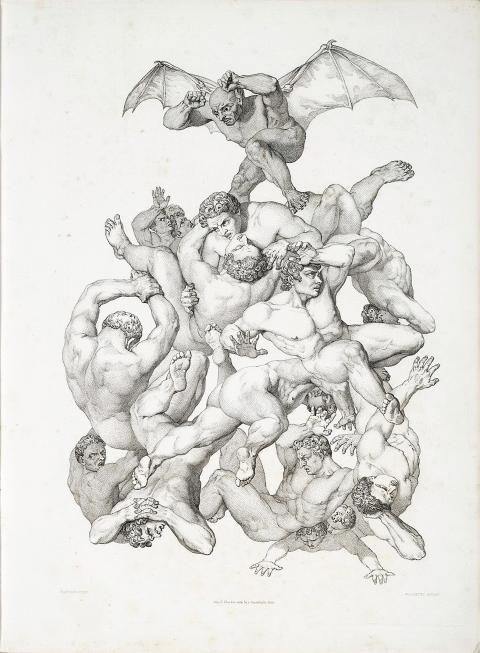Chinese practice
天崩地裂;天翻地覆;雞飛狗跳
Heaven falls and Earth rends; Heaven and Earth turning upside down;

Photo: Wikimedia Commons
照片:維基共享資源
chickens flapping and dogs bounding
(tian1 beng1 di4 lie4; tian1 fan1 di4 fu4; ji1 fei1 gou3 tiao4)
巴布狄倫的「今非昔比」(Things Have Changed),是電影《天才接班人》(Wonder Boys)的主題曲,電影中的主角是一位面臨中年危機的大學教授。這首歌的歌詞有很多地方都跟電影中的情節相關,但如同狄倫許多歌一樣,其歌詞意義有很多詮釋的空間。在第一段副歌後,狄倫唱道:
Standing on the gallows with my head in a noose, (我站在絞刑架上,頭上套著絞索,)
Any minute now I’m expecting all hell to break loose. (現在隨時都可能會天崩地裂。)
這句歌詞是主人公意識到自己的處境岌岌可危,或許夾雜了一些自承行為不軌的意味。然而,這句歌詞也傳達了某種疏離的感覺,彷彿自己只是個旁觀者,這一切都事不關己。整首歌不斷重複的副歌是「I used to care, but things have changed」(我以前很在乎,但現在情況已經變了)。
這句歌詞是主人公意識到自己的處境岌岌可危,或許夾雜了一些自承行為不軌的意味。然而,這句歌詞也傳達了某種疏離的感覺,彷彿自己只是個旁觀者,這一切都事不關己。整首歌不斷重複的副歌是「I used to care, but things have changed」(我以前很在乎,但現在情況已經變了)。
歌詞中說他在「expecting all hell to break loose」(預期地獄都破裂開來),這到底是什麼意思?他是在等待救援,並預期救兵到來時造成騷亂嗎?他是否在等待絞刑架地板打開,身體直落下去後脖子猛然折斷的痛苦?他是否在想像被弔死後,再睜開眼時所見是一片地獄的景象?或者絞刑架只是用來比喻他所身處的複雜景況,而他自知很快就得要為自己所做的錯誤抉擇負起責任?
「all hell breaks loose」一般用法是指在相對平靜的時候,突然爆出噪音、混亂或暴力事件。此語皆用來表達負面意義,但所描述的情況不一定是嚴肅的。
「all hell breaks loose」一語首次被記錄下來,是在英國劇作家羅伯特‧格林(一五五八~一五九二)出版於一五九四年的劇作《倍根教士與彭該教士》:
「Miles, Master, master, up! Hell’s broken loose ...; and there’s such a thunder and lightning, that I warrant all Oxford is up in arms」(邁爾斯先生,主人,起來!地獄裂開了...;而且雷電大作,我敢說整個牛津全都警戒起來了)。
不久之後,此語出現在約翰‧密爾頓(一六○八~一六七四)的《失樂園》第四書,天使加百列嘲笑撒旦想要逃離地獄:
“But wherefore thou alone? Wherefore with thee came not all hell broke loose?” (「你為何單獨前來?你的同夥為何不跟你一起逃走?」)
《失樂園》中的「all hell broke loose」,形式為主詞「all hell」,接形容詞「broke loose」;然而,此語作為現代成語,其結構被解釋為主詞片語「all hell」,以及動詞片語「break loose」。
「all hell breaks loose」用中文來說,可用成語「天崩地裂」或「天翻地覆」來表達,意指劇烈的變革或重大的社會動盪。「all hell breaks loose」的字面意義或許翻譯成「鬼門關大開」會較容易了解。若所描述的混亂之爆發非屬嚴肅的情況,則可使用另一個較有畫面的成語「雞飛狗跳」。
(台北時報林俐凱譯)
我的天啊!我被甩了。我的世界一夕之間天崩地裂。
(My God. I’ve been dumped. In a flash, my world has been turned upside down.)
他的職業生涯被一樁收賄的醜聞攪得天翻地覆。
(His career has been thrown into chaos because of a bribery scandal.)
帶孩子真的好累,只是吃個飯、出個門,常常都弄得雞飛狗跳、人仰馬翻。
(Looking after kids is exhausting. Just getting them to eat something and get them out the door can lead to all hell breaking loose, and all manner of chaos erupting.)
英文練習
all hell broke loose
The Bob Dylan song Things Have Changed featured in the movie Wonder Boys. The main character in the movie was a university professor experiencing a midlife crisis. Many of the lines of the song refer to events in the movie but, as with many Dylan lyrics, they are open to interpretation. Immediately after the first chorus, Dylan sings,
Standing on the gallows with my head in a noose,
Any minute now I’m expecting all hell to break loose.
These are the words of a protagonist aware of the precariousness of his situation, perhaps interwoven with an acknowledgement of wrongdoing. The line is also delivered, however, with a degree of detachment, as if he were merely an objective observer, or one that no longer cares. The refrain throughout the song is “I used to care, but things have changed.”
What does he mean when he says he’s expecting all hell to break loose? Is he perhaps anticipating a rescue attempt, and the chaos that would create? Is he expecting to be dropped through the gallows floor and to be suddenly exposed to the pain of his neck being broken? Is he imagining being hung and waking up in a landscape of Hell? Or is the gallows a mere metaphor for the complicated situation he has found himself in, and he knows that soon he is going to have to answer for all the wrong life choices he has made?
In general usage, the phrase “all hell breaks loose” refers to a period of relative calm that suddenly erupts into noise, chaos or violence. It is always used in a negative sense, but not necessarily to talk about a very serious situation.
The phrase was first recorded in the English dramatist Robert Greene’s (1558–1592) play Friar Bacon and Friar Bungay, printed in 1594:
“Miles, Master, master, up! Hell’s broken loose...; and there’s such a thunder and lightning, that I warrant all Oxford is up in arms.”
Soon after, the phrase appears in Book IV of Paradise Lost by John Milton (1608 –1674), where the Angel Gabriel taunts Satan for attempting to escape from Hell:
“But wherefore thou alone? Wherefore with thee came not all hell broke loose?”
Here, the phrase “all hell broke loose” is in the form of subject (“all hell”) followed by adjectival phrase (“broke loose”): in the modern idiom, it is interpreted as subject (“all hell”) plus phrasal verb (“break loose”).
In Chinese, we can use the idiom 天崩地裂 (literally meaning “Heaven falls and Earth rends”) or 天翻地覆 (“Heaven and Earth turned upside down) used to refer to violent revolution or major social upheaval. Perhaps more literally, we could use the phrase 鬼門關大開, meaning “the Gates of Hell are open wide;” for a better visual alternative, especially when talking about the eruption of chaos in less serious circumstances, we can use the phrase 雞飛狗跳, meaning “chickens flapping and dogs bounding.”
(Paul Cooper, Taipei Times)
I don’t want to look after their dog this summer. The minute it comes into the house, all hell breaks loose.
(今年暑假我不想幫他們照顧狗,因為牠一進到我屋裡,就搞得天下大亂。)
This is the last Using Idioms page we will ever do. When the readers find out about this, all hell will break loose.
(這是「活用成語」單元最終章。讀者發現後,就會陣腳大亂。)

Have you ever dreamed of hiking Taiwan’s majestic Mt. Jade or visiting Peru’s breathtaking Machu Picchu? These adventures sound amazing, but there’s something you should know about first: “altitude sickness.” This condition strikes when you climb to a higher elevation too quickly. The higher you go, the thinner the air becomes, making it harder for your body to absorb oxygen. The symptoms usually begin within hours of reaching high altitudes — about 2,500 meters or higher. You might experience headaches, dizziness, nausea, shortness of breath, or extreme fatigue. These symptoms can last for several days. The severity of altitude sickness varies

Have you ever wondered why “Manila envelopes” carry that name? The answer lies in a plant native to the Philippines. Though a fruit-producing plant, abaca is most valued for its leaf stalks, which are __1__ to extract fibers known as “Manila hemp.” These fibers are known for their strength and resistance to saltwater. Because of its __2__ in sea environments, Manila hemp has long been used to make Manila rope, a staple in the sailing and maritime industries for centuries. It withstands harsh ocean conditions without its flexibility being __3__. Manila rope doesn’t break down easily when exposed to

A: In addition to boyband Energy’s concerts, Taiwan’s first major male dance revue has attracted attention. B: Several South Korean male dance revues and Australia’s Thunder from Down Under often tour Taiwan. Now Taiwan’s first all-male revue has finally appeared. A: According to the Liberty Times, Muscle High: A Male Dance Revue from Taiwan, featuring 13 hunks, opened last month and will run until Sept. 14. B: The rise of “hunk fever” in recent years has even caused a trend of working out in Asia. A: Let’s go to the Taipei Music Center’s Sub Livehouse for the show. A:

A: Any fun events happening this weekend? B: Boyband Energy’s concerts and Taiwan’s first major male dance revue have both sparked anticipation recently. A: Energy staged a comeback last year — 15 years after they disbanded — and they’re now more popular than ever. B: Their megahit “Friday Night” even won Song of the Year at the Golden Melody Awards. A: To pay tribute to the Queen of Pop Madonna, they added her choreography of 16 continuous jump squats to their music video, prompting a “16-squat challenge” that went viral across Taiwan. Do you wanna try it out? A: